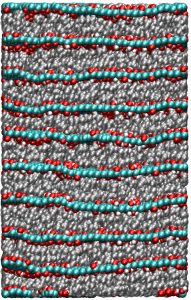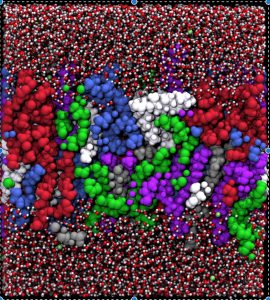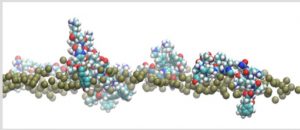In the Lorenz Lab, we are currently applying state-of-the-art molecular dynamics simulation methods to a variety of interesting and impactful research areas including:
Confined liquids
We are interested in the effect of nanoscale confinement on the dynamic and structural properties of simple and complex liquids. In this area, we have a keen interest in problems related to the electrokinetic properties of ionic solutions near charged interfaces and the tribological properties of confined fluids.
Lipid-lipid interactions
We are interested in determining which molecular scale interactions govern the various interesting structural and mechanical properties observed in the membranes of various cell types. Currently we are particularly interested in investigating mimics of the membranes found in red blood cells, brain cells, and in various types of bacteria.
Lipid-peptide interactions
We are interested in determining the molecular scale interactions which play a key role in the various mechanisms that peptides perform while interacting with lipid membranes. Currently, we are particularly active in attempting to understand the key interactions in the activity of antimicrobial peptides.
Non-equilibrium thermal transport
We have developed an algorithm for implementing the Generalised Langevin Equation (GLE) for thermal transport within classical and open quantum systems. Toy systems have been used to demonstrate its application to thermal transport. We are currently interested in using the classical GLE algorithm to study the non-equilibrium thermal transport across solid/liquid interfaces.
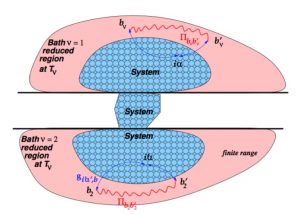
Peptide-material interactions
We are interested in understanding the interactions that allow a functionalised interface to encourage or discourage the binding of peptides. These interactions are important when designing functionalised nanoparticles for therapeutic applications, biological sensing materials and antifouling interfaces. Currently we are studying the interactions of various fibronectin domains with polymeric interfaces.
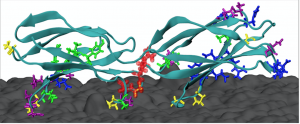
Self-assembly of amphiphilic molecules
We are interested in understanding how the underlying chemistry of the amphiphilic molecules effect their ability to self-assemble and the structural properties of the resultant self-assembled structure (e.g. shape, size, interfacial properties). The majority of the work we are currently working on in this area is focussed on the self-assembly of drug delivery vehicles, so we are also interested in how the underlying chemistry of the amphiphilic molecule and of a drug molecule govern the ability of the self-assembled structure to encapsulate the drug molecule.
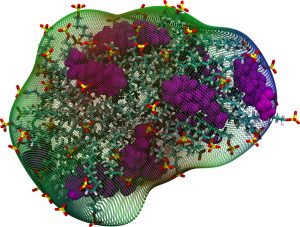
Solvation of biological molecules
The interaction between peptides and lipids (and other biological molecule) and their environment have a significant effect on their structure and dynamics. Therefore, we are quite interested in obtaining a detailed picture of the solvation properties of these biological molecules and how they change in different environment. Additionally, we are interested in determining what role do interactions between solvent molecules and biological molecules in the resulting structure that the biological molecule takes.

NOTE: If you are interested in joining our group as a PhD student or a postdoctoral fellow to work in any of these areas, then please do not hesitate to contact Chris (chris.lorenz@kcl.ac.uk).

